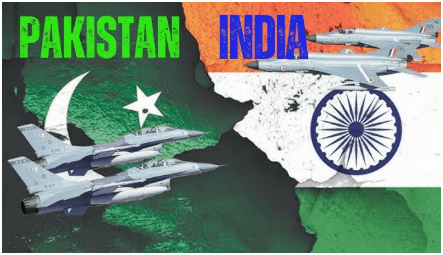India has struck back decisively after Pakistan’s provocative military attack on Indian soil as part of its retaliation to India’s earlier strikes in Operation Sindoor.
In a high-stakes military operation, India’s Air Force destroyed key air defense systems in Lahore, Pakistan’s military hub, crippling Pakistan’s ability to launch further strikes and neutralizing the threat of escalation.
The series of military actions follows a deadly exchange that began with India’s precision airstrikes targeting terror infrastructure across Pakistan and Pakistan-administered Kashmir in response to the April 22 Pahalgam terrorist attack. In retaliation, Pakistan launched a counteroffensive that involved airstrikes near the border in Jammu and Kashmir, as well as a missile strike targeting Indian military positions in the region. Pakistani officials claimed the operation, named “Operation Zarb-e-Mujahid,” was intended to deter India from further action and to exact a price for the Pahalgam tragedy.
However, India’s swift response has once again shifted the balance of power in the region. Indian officials confirmed that Pakistan’s initial strike, which aimed at military installations in Indian territory, was thwarted when India’s state-of-the-art air defense systems intercepted multiple incoming missiles. While some minor damage was reported in the border region, no Indian military personnel were injured.
In retaliation, India launched a massive counter-strike targeting Pakistan’s military infrastructure, specifically its air defense systems in Lahore. Using precision-guided missiles and Rafale fighter jets, India’s attack was described as a “crippling blow” to Pakistan’s aerial capabilities. Pakistani sources confirmed that the Lahore Air Defense Command and key radar installations were completely destroyed, severely hindering Pakistan’s ability to mount further aerial offensives. India’s Ministry of Defense issued a statement asserting that the strike had neutralized Pakistan’s strategic capacity to launch air-based retaliation, ensuring that India’s borders would remain secure.
The consequences of this operation are significant. Pakistan’s military has been thrown into disarray, with many of its aircraft grounded and air traffic over northern Pakistan and parts of Kashmir temporarily suspended. Lahore, historically known as a cultural hub, has now become a focal point in the military standoff, with civilian infrastructure in the vicinity of military installations suffering collateral damage.
Following the strike, Pakistani officials have accused Bharat of violating the rules of engagement in wartime, calling the attack an “unprovoked escalation.” The Pakistani government condemned the destruction of critical infrastructure and vowed to retaliate at a time of its choosing. Pakistani Prime Minister Imran Khan warned that India’s continued military action could lead to “unimaginable consequences” and reiterated Pakistan’s commitment to defending its sovereignty.
The international community has reacted with alarm, as both countries are nuclear-armed and have engaged in multiple military confrontations in the past. The United Nations called for an immediate cessation of hostilities and urged both nations to return to dialogue. Countries such as the United States, China, and Russia have expressed concern over the escalating violence, warning that the situation could spiral out of control. In a joint statement, the European Union and several Asian powers urged India and Pakistan to exercise restraint, emphasizing the importance of diplomatic channels over military engagements.
Despite the global calls for de-escalation, Bharat remains resolute. In a televised address, Prime Minister Narendra Modi asserted that India’s actions were necessary for national security. “Bharat will not stand idly by in the face of terrorism or aggression. We have taken decisive action to safeguard our citizens, and we will continue to do so as necessary,” Modi said. His statements were met with widespread public support across India, where rallies and demonstrations praising the Indian military’s actions have erupted in cities nationwide.
The military strikes have also triggered significant economic consequences. A major disruption in air travel has been reported, with hundreds of flights cancelled or rerouted across the region. Airports in Bharat , Pakistan, and the UAE, where many expatriate workers travel, have faced chaos. Airline executives have expressed concerns over ongoing disruptions, estimating that the financial toll could be in the tens of millions of dollars. International airlines are closely monitoring the situation and reassessing flight routes to ensure passenger safety.
On the ground, civilians in both countries remain on edge. In Bharat , residents near the border have been advised to take shelter, and schools in Jammu and Kashmir have been temporarily closed. In Lahore, while the city is not under direct military attack, citizens are facing power outages and disruption to basic services as the region’s infrastructure struggles to cope with the fallout from the airstrikes.
Looking ahead, the situation remains precarious. While Bharat has maintained that its actions are aimed at countering terrorism and ensuring security, the prospect of further retaliatory strikes from Pakistan looms large. The risk of further military escalation remains high, and the possibility of a broader regional conflict could ignite at any moment, particularly if nuclear posturing or tactical miscalculations occur.
For now, the world watches with bated breath as Bharat and Pakistan teeter on the edge of a deeper military confrontation. Diplomatic efforts, spearheaded by global powers and regional stakeholders, will be crucial in the coming days as both nations assess their next moves. The outcome of this latest round of hostilities will likely shape the geopolitical landscape of South Asia for years to come.
Stay informed with the latest updates – click here .

